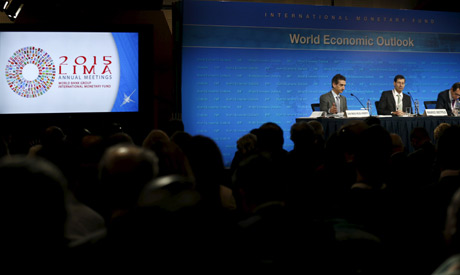
Gian Maria Milesi-Ferretti, Deputy Director, Research Department of IMF, Maurice Obstfeld, Economic Counsellor and Director, Research Department of IMF and Thomas Helbling, Division Chief, Research Department of IMF (L-R) deliver the International Monetary Fund's media briefing on the world economic outlook during its annual meeting in Lima, Peru, October 6, 2015. (REUTERS)
The annual International Monetary Fund (IMF) meeting will begin on Thursday in Peru, lasting three days with nearly 10,000 attendees from around the world.
“All countries are keen to attend the conference at a time when the majority of them are experiencing economic tensions, with China’s currency devaluation, the falling prices of oil and basic commodities, and the anticipation surrounding the US Federal Reserve raising interest rates,” said Maurice Obstfeld, author of the IMF’s Economic Outlook report, at the launch of the World Bank's latest financial projections on Tuesday.
Obstfeld said attendees from all corners of the world came to Lima asking the same question: What effect will events in China have on my country’s economy?
The situation is somewhat different for a number of countries, including those of the Middle East and notably Egypt, said Thomas Helbling, Chief of the World Economic Studies Division, also at the launch of the World Bank's figures on Tuesday.
Egypt and Morocco achieved higher growth rates than those of other countries in the Middle East, according to a World Bank statement issued on Monday on the sidelines of the IMF meetings.
The World Bank estimates that the Middle East achieved a growth of 2.8 percent in 2015, with the drop in oil prices and consequent decline of growth in petroleum exporting countries.
But despite the regional slowdown, the Bank expects Egypt to achieve a growth rate of above four percent in 2015 and 2016, thanks to continuing reform and burgeoning stability.
“Egypt has a success story which it can present to the whole world,” Egyptian investment minister Ashraf Salman told Ahram Online weeks before the conference, hinting that the IMF meeting would provide an appropriate platform to do that.
This success story, according to Salman, is the beginning of an economic recovery achieved through economic reform, projects like the new Suez Canal and the discovery of a giant gas field in Egyptian waters. “The conference is a real opportunity to promote Egypt,” concluded Salman.
To this end, Egyptian Minister of International Cooperation Sahar Nasr headed to Peru on Tuesday to participate in the IMF and World Bank annual meetings in her capacity as Egypt’s delegate to the World Bank, as part of a team headed by the governor of Egypt for the IMF and governor of the country’s Central Bank Hisham Ramez, and finance minister Hany Kadry.
On the agenda are a number of meetings with World Bank and IMF officials, and heads of financing institutions with strong ties to the Egyptian government such as the African Development Bank, the European Bank for Reconstruction and Development, and executives from large companies and other heads of delegations attending the meetings.
Nasr is also participating in meetings of the G24 on the sidelines of the conference, as well as meetings of the African Bloc, and chairing a meeting of Arab Governors with the president of the World Bank to discuss the Bank’s strategy for the Middle East and North Africa and new World Bank financing mechanisms developed to counter the impact of recent regional events.
The Egyptian delegation will focus on presenting its priorities for the upcoming period, and how different financing institutions can support the government in implementing its development strategy for economic recovery and social justice.
Short link: